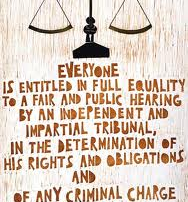
Admission of evidence from absent and anonymous witnesses
JUDGMENT
Bátěk and Others v. the Czech Republic (no. 54146/09) 12.01.2017
SUMMARY
The applicants, customs officials, were convicted for abuse of powers and for acceptance of bribes. The case concerned the admission of evidence in their trial by anonymous witnesses and witnesses who were absent. The secret police agent used by the authorities to investigate the case was examined as “anonymous witness”. Truck drivers who were key witnesses at the pre-trial stage were not invited to the audience as they were foreign nationals. By relying on Article 6 § 1 and 3 (d) (right to a fair trial and the right to witness and witnesses) of the European Convention, they complained in particular that the convictions were not fair because they had been based on the admission of evidence by anonymous and absent witnesses, whose testimonies could not effectively be challenged and examined. The ECtHR found that there had been no violation of Article 6 § 1 in conjunction with Article 6 § 3 (d).
USE
The admission of evidence of unidentified and absent witnesses does not constitute violation of Article 6 (3d).
PROVISIONS
Article 6 par. 1 3d
PRINCIPAL FACTS
The applicants, Roman Bátěk, Radek Blažej and Karel Elsner, are Czech nationals who were born in 1969, 1968, and 1972 respectively and live in Lanžhot (Mr Bátěk and Mr Elsner) and Břeclav (Mr Blažej). The applicants, customs officers, were convicted of abuse of authority and accepting bribes. The case concerned the admission of evidence at their trial from absent and anonymous witnesses.
The applicants were employed as customs officers by the Lanžhot Customs Office on the border between the Czech and Slovak Republic from September 2003 to January 2004. Their team of customs officers was infiltrated by an undercover police agent in December 2003. As a result of her observations, the undercover agent suspected the applicants of soliciting and accepting bribes from truck drivers in exchange for trouble-free customs clearance.
The authorities took action by obtaining the testimonies of 20 truck drivers. The truck drivers were interviewed in the presence of a judge by means of an urgent measure procedure as they were all
foreign nationals. The drivers confirmed a general practice of customs officials’ accepting bribes. They were, however, unable to describe specific individuals. Subsequently the applicants, along with 15 other customs officers, were charged with abuse of the authority of public official and accepting bribes, and were officially indicted in February 2005.
During the hearing at the Břeclav District Court the undercover police agent gave her testimony outside the courtroom via an audio streaming device, as an anonymous witness. The agent’s potential future operations were cited as the reason for not revealing her identity. Only the third applicant attended the hearing and was able to question her. The truck drivers were not summoned to testify because they were foreign nationals. Therefore the transcript of their testimonies collected during the pre-trial stage was read out at the trial.
The applicants and other defendants were found guilty as charged by the district court in May 2006. They were sentenced to one year’s imprisonment suspended for two years’ probation and were fined. The court primarily based its decision on the written report by the undercover agent, corroborated by various customs documents and the truck drivers’ papers confirming times and places of customs clearance.
The applicants appealed the decision, contesting the non-disclosure of the police agent’s identity and the fact that they did not have the opportunity to cross-examine the truck drivers. Their appeal was dismissed by the Brno Regional Court in March 2007 as unsubstantiated. The subsequent constitutional appeal of the applicants was dismissed in April 2009.
THE DECISION OF THE COURT
Relying on Article 6 § 1 and 3 (d) (right to a fair trial and right to obtain attendance and examination of witnesses) of the European Convention, the applicants complained in particular that their convictions had not been fair because they had been based on the admission of evidence from absent and anonymous witnesses, whose testimonies they had not been able to effectively challenge.
No violation of Article 6 § 1 in conjunction with Article 6 § 3 (d)


